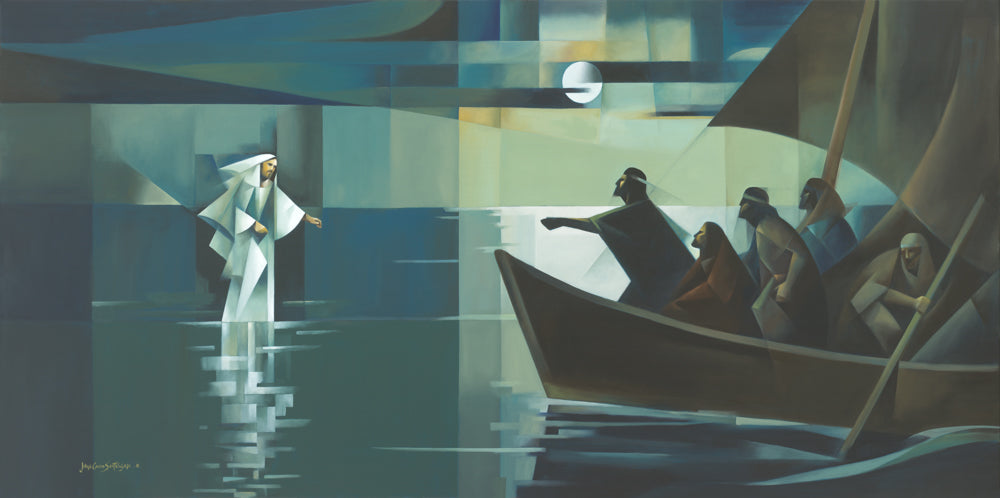
“Take heart, it is I; do not be afraid.” (Matthew 14:27b)
There’s a hard and fast rule for dealing
with a crisis: if you panic, you die. During the Great Depression Franklin
Roosevelt told us the only thing we had to fear was fear itself. That’s because
people do stupid things whenever our sense of the normal becomes unhinged. We’ll
run from a wild animal, thereby encouraging said beast to chase us, when we
should be backing away slowly. We’ll hit our brakes in a skid when we should be
taking our foot off the gas and steering into the skid. We’ll pull money we don’t
even use out of our investment portfolio when the market goes south,
effectively realizing the loss and
incurring tax penalties, rather than waiting patiently for a turnaround.
Fear is a pretty strong tool of the devil.
It makes us forget we have an all-powerful God. In the First Lesson in the RCL
for Pentecost 10, Year A (1 Kings 19:9-18) even the prophet Elijah—the superstar
of prophets who’ll make a special guest appearance on the Mount of the
Transfiguration—starts to freak out. This guy has just slain 400 prophets of
Baal, but when the evil Queen Jezebel puts a hit out on him he panics and
high-tails it for the wilderness. Even after God provides him with food to
sustain him for forty days and forty nights, he’s still overstating his case,
whining and crying that he’s the only one left who loves the true God. God has
to jerk his chain a little. God sends forth a tornado, an earthquake, and a
brush fire[i], as if to say, “Now that I’ve
got your attention, Elijah, let me give you the facts. This isn’t as bad as you think. There are still 7,000 in Israel who are faithful
to me and have not bowed to Baal. You’re not the only one, Buster, so get over
yourself.”
We see Peter acting the same way as Elijah
in our Gospel Lesson (Matthew 14: 22-33). We‘re told the boat the disciples are
in is being “battered by the waves” (v.24). Some Bible scholars see the boat as
a metaphor for the church and the water as an ancient symbol of chaos. The
interpretation here is that Matthew’s early Christian community is getting the
crap knocked out of it by the chaos that surrounds it. This chaos could consist
of lots of things in the ancient world, but most probably included a
family-sized load of persecution.
Fortunately, the church still has Jesus.
Jesus can walk calmly through the storm and angry sea, serenely telling the church,
“Don’t freak out! It’s me!”[ii] Of course, ol’ Pete has
got to have some reassurance, so he asks Jesus if he can come to him on the
water—a pretty unsafe move under the circumstances if you ask me! But Jesus is
never one to pass up a good teaching moment. He lets Peter do a pretty dumb
thing. Peter looks at the waves, gets scared, and has to beg Jesus for help. Isn’t
that just the way? Whenever we try to combat the chaos on our own, we always
end up turning back to Jesus.
I’ve heard some people look at the COVID-19
pandemic, the civil unrest in the US, the economic troubles, and the intensity
of weather events and conclude that the world is coming to an end. I’d agree
that some aspects of our world may be on their way out, but I’m not sure it’s all over. And even if it is the end of
civilization or humanity, would that really be so bad? Aren’t we still the
children of God promised a home with God forever?
Uncertainty is no fun. We’ll fear what we
don’t understand, and we’ll grow to hate what we fear. We can easily fall
victim to frustration, anger, doubt, and—ultimately—despair. The last mentioned
is what Luther called a “great and shameful” sin. So let’s remember who we are:
children of the Heavenly Creator. Let’s try not to overstate our current
situation like Elijah or jump ship like Peter. Even in the midst of the
battering waves of chaos we can be imitators of Christ. We can be loving,
self-sacrificing, grateful, and evangelical—preaching to others by the way we
bear our own hardships and disappointments. Yeah, I’m sure there will be some who
fall away and won’t return to the church when this is all over, but I prefer to
have faith in the ones who will not bow the knee to disappointment or kiss the
idol of bitterness. Remember: we don’t have to suck it up forever—we just have
to trust for today and keep tomorrow’s troubles for tomorrow. Personally, I
like to pray in the words of that great old gospel hymn:
Precious Lord, take my hand,
Lead me on, help me stand.
I am tired, I am weak, I am worn.
Through the storm, through the night,
Lead me on to the light.
Take my hand, Precious Lord, lead me home.
‘Til next time, may God give you peace and
comfort. Thanks for reading.
[i]
Just FYI, all of these natural disasters were believed to be caused by Baal,
who was a sort of pagan weather god. The Bible says that God was not in the
wind, the earthquake, or the fire. See 1 Kings 19:11-12.
[ii]
The Greek here is one word Qarseite! (tha-ra-seet-ay) which is variously
translated as “have courage,” “take heart,” “be of good courage,” “be of good
cheer,” etc. We don’t really have an equivalent word in English, but you get
the idea. When Jesus introduces himself, he just says Ego eimi (Ego em-ee) or “I am.” I guess he
just had to remind everybody that he is God by using the divine name found in
Exodus 3:14.
No comments:
Post a Comment